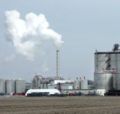Chem395:Welcome
MANUFACTURING (Chemistry 395) |
| MAIN PAGE |
|---|
| Syllabus — Schedule |
| Welcome page Contact Dr. Walker |
| This week |
| Today's tasks |
| Course units 1 - 2 - 3 - 4 - 5 - 6 - 7 8 - 9 - 10 - 11 - 12 - 13 - 14 |
| Blackboard site |
|
|
| Course content |
| Assignments |
| Practice problems |
| Discussions |
|
|
| General wiki help |
| Basic editing Create an account Protocols Tutorial Demo, for practice |
Chemistry 395: Sustainable Manufacturing
Welcome to the online course on Sustainable Manufacturing! Please take a look at the Chem395:Syllabus and Chem395:Schedule to get an idea of what work is involved, and read the section below for a general introduction.
Contents
All course materials are on this wiki. A wiki is simply a user-editable website. You can navigate your way around this site just like a regular website, using the back button etc. as usual. There are navigation templates on many pages; the main template is on the right and it provides links to the main site pages. Some pages, such as the weekly schedules or the unit pages, have an additional template at the foot of the page to help you get quickly to related pages. Do not edit the actual course content. Some of the course content is also duplicated on Blackboard for you, but this is not the main repository for information.
To participate in discussions, or to upload your papers, you will need to edit the wiki. Discussions will be held on the pages found by clicking the "discussion" tab on the relevant page, and then the "edit" to type in your contribution. To upload a paper, you will enter this directly on the appropriate page by clicking the "Edit" tab. You can alternatively type the paper in MS Word (or similar) and upload it (by clicking the "edit" tab and pasting it in), then format it for the wiki.
If you want to find out your grade, this is the only course material unavailable on the wiki. Please go to the grades page on Blackboard, which will be set up soon.
Using the wiki
Don't panic! Using the wiki is pretty easy, and it's almost impossible to do permanent damage! (Please don't try to prove me wrong on that one.) To edit a page, you can just click the "edit" tab and start typing, then hit "Save page" (but please don't practice on this page!).
You will need to learn a few basics to do things properly, so take a few minutes to look at the help pages, which are also linked via the "Help" in the box on the left, or the specific help pages linked from the Chem 395 box on the right. First you'll need to set up an account. Then you can look at some basic editing, take a detailed Tutorial, and try practicing your editing skills on the demonstration pages where you have the chance to fix up some awful pages...
We will set up a time that both of us are available, so I can help you through any problems you run into. You can run through the self-programming tutorial at that time to make sure you are comfortable in using the wiki.
What is sustainable manufacturing?
The world's resources are running out, and therefore sustainable manufacturing is likely to become a necessary part of our future. Our goods will need to be designed for safe and efficient production, and they should be easily re-used or recycled when they become obsolete or broken. Our processes will need to use the minimum of energy and materials, with the minimum of waste. We must completely rethink how manufacturing is organized, to ensure that sustainability lies at the heart of all planning and design. In terms of a business model, a company will need to include all environmental considerations in the balance sheet. Government should lay out the right infrastructure to allow sustainable industries to flourish, and academia should facilitate the development of sustainable technologies.
This should be seen as part of a wider movement towards sustainable development. This worldview considers that human civilization can continue to live comfortable in prosperity, but only if our entire society is restructured to be environmentally efficient. It states that we need to design our cities and towns with "green" housing and sustainable transportation. Our society should not be centered on consumption and consumerism, but on careful stewardship of our resources.
There are many aspects to sustainable manufacturing - engineering and chemistry, process design, product life cycle, quality control, waste and hazardous materials, energy and transportation, as well as how the enterprise is managed. This course aims to cover all of these aspects.
